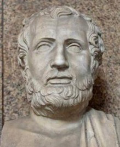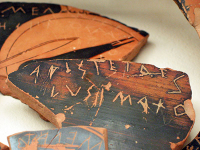Aristides: 'Just' Hero of Ancient Greece
One of the heroes of the Greek victory in the Greco-Persian Wars was Aristides, who was so revered for his morality that he was very often referred to as "the Just." 
As is the case with many of his fellow Greeks, historians know little about his early life. The family was known to be not wealthy. Somewhere along the way, Aristides fell in with Cleisthenes, the famed democratic reformer. Aristides was a strategos, equivalent to a commander, in Athens' victory at the Battle of Marathon. He was then elected archon. The victory at Marathon did not convince the Persian army to return home. Seeing the success of the Greek army at Marathon, Aristides believed in a continuation of a land-based military strategy. In this, he found himself opposed by Themistocles, the famed naval commander and strategist who convinced Athens and other city-states to bulk up the Greek navy in order to defeat Persia. 
Themistocles gained the upper hand, and it was Aristides who found himself ostracized. One of the stories of Aristides' "justness" is that when it was time to vote for ostracism, one of the voters who could not write asked Aristides, whom he did not recognize, to write the name of Aristides on the standard pottery shard that was used to signal a person who should be exiled for a decade. When Aristides, without revealing his identity, asked the man why, the man replied that he didn't know Aristides but was tired of hearing him called "the Just." Putting justice above all else, Aristides wrote his own name on the shard and turned it in. History does not record how many other times his name appeared on pottery shards that year, but the name of Aristides was on more shards than any other name and so he was sent away. The exile didn't last the full 10 years, however, because Aristides and other able commanders were recalled to defend against a renewed Persian attack. Aristides led a vital infantry attack on a Persian garrison stationed on the island of Psyttaleia, securing the Greek naval battle at Salamis. And in 479 B.C., Aristides was again elected strategos and played a large role in the combined Greek victory at the Battle of Plataea. Aristides went on to a high-ranking position in the Delian League. He is said to have died in 468 B.C.
|
|
Social Studies for Kids
copyright 2002–2026
David White




